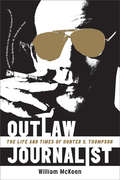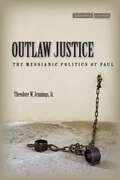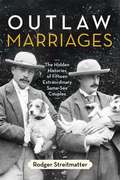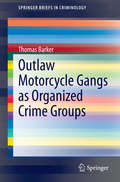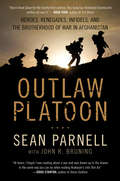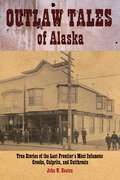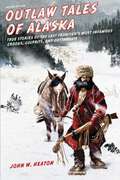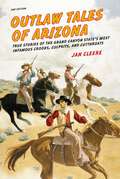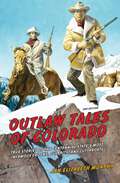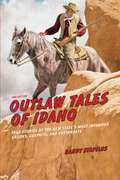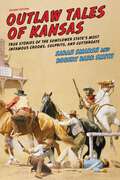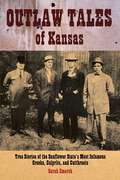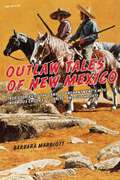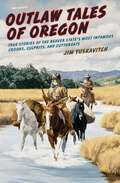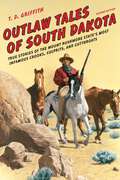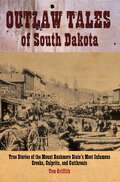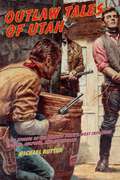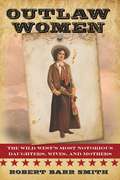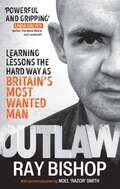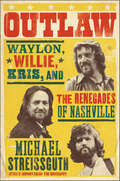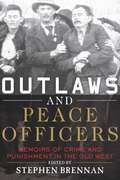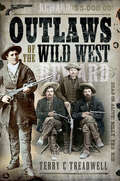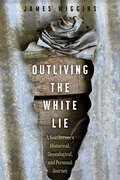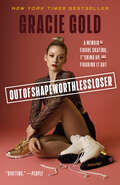- Table View
- List View
Outlaw Journalist: The Life and Times of Hunter S. Thompson
by William Mckeen"Gets it all in: the boozing and drugging . . . but also the intelligence, the loyalty, the inherent decency." --Jonathan Yardley, Washington Post Hunter S. Thompson detonated a two-ton bomb under the staid field of journalism with his magazine pieces and revelatory Fear and Loathing in Las Vegas. In Outlaw Journalist, the famous inventor of Gonzo journalism is portrayed as never before. Through in-depth interviews with Thompson's associates, William McKeen gets behind the drinking and the drugs to show the man and the writer--one who was happy to be considered an outlaw and for whom the calling of journalism was life.
Outlaw Justice: The Messianic Politics of Paul (Cultural Memory in the Present)
by Theodore W. Jennings Jr.This book offers a close reading of Romans that treats Paul as a radical political thinker by showing the relationship between Paul's perspective and that of secular political theorists. Turning to both ancient political philosophers (Plato, Aristotle, and Cicero) and contemporary post-Marxists (Agamben, Badiou, Derrida, and Žižek), Jennings presents Romans as a sustained argument for a new sort of political thinking concerned with the possibility and constitution of just socialities. Reading Romans as an essay on messianic politics in conversation with ancient and postmodern political theory challenges the stereotype of Paul as a reactionary theologian who "invented" Christianity and demonstrates his importance for all, regardless of religious affiliation or academic guild, who dream and work for a society based on respect, rather than domination, division, and death. In the current context of unjust global empires constituted by avarice, arrogance, and violence, Jennings finds in Paul a stunning vision for creating just societies outside the law.
Outlaw Marriages: The Hidden Histories of Fifteen Extraordinary Same-sex Couples
by Rodger StreitmatterYears before gay marriage became a hot-button political issue, same-sex unions flourished in America. In Outlaw Marriages, cultural historian Rodger Streitmatter reveals that gay marriage isn't a twenty-first-century idea. He spans over a hundred years and profiles fifteen couples who made major contributions to this country in an impressive range of fields--from music and education to journalism and modern art. Among the notables whose lives and loves are profiled are poet Walt Whitman, literary icon Gertrude Stein, movie legend Greta Garbo, playwright Tennessee Williams, novelist James Baldwin, and activist Audre Lorde. While no partnership is the same--some were tumultuous, while others were more supportive and long-lasting--all changed the course of American history.
Outlaw Motorcycle Gangs as Organized Crime Groups
by Thomas BarkerThis brief covers the unique crime group of Outlaw Motorcycle Gangs. Outlaw Motorcycle Gangs are adult criminal associations composed of "bikers" living a deviant lifestyle that includes individual, group, and club criminal behavior. These groups are sometimes called one percenters, due to the American Motorcycle Association statement that ninety-nine percent of motorcyclists are law abiding citizens. While many may be familiar with the reputation of the Hells' Angels, many may not realize the wide network of other Outlaw Motorcycle Gangs or the extent of their involvement in criminal activities. The brief includes a breakdown of the criminal networks and activities of these groups, which operate similarly to an organized crime group. It also covers the evolution of motorcycle clubs to motorcycle gangs. It examines the recent trend of American-based motorcycle gangs into international organized crime activities. This book will be of interest to researcher studying criminology, particularly organized crime and criminal networks, as well as international and comparative law and public policy.
Outlaw Platoon: Heroes, Renegades, Infidels, and the Brotherhood of War in Afghanistan
by John Bruning Sean ParnellIn combat, men measure up. Or don't. There are no second chances. In this vivid account of the U.S. Army's legendary 10th Mountain Division's heroic stand in the mountains of Afghanistan, Captain Sean Parnell shares an action-packed and highly emotional true story of triumph, tragedy, and the extraordinary bonds forged in battle. At twenty-four years of age, U.S. Army Ranger Sean Parnell was named commander of a forty-man elite infantry platoon-a unit that came to be known as the Outlaws-and was tasked with rooting out Pakistan-based insurgents from a mountain valley along Afghanistan's eastern frontier. Parnell and his men assumed they would be facing a ragtag bunch of civilians, but in May 2006 what started out as a routine patrol through the lower mountains of the Hindu Kush became a brutal ambush. Barely surviving the attack, Parnell's men now realized that they faced the most professional and seasoned force of light infantry the U.S. Army had encountered since the end of World War II. What followed was sixteen months of close combat, over the course of which the platoon became Parnell's family: from Staff Sergeant Greg Greeson, the wise, chain-smoking veteran who never lost his cool; to Specialist Robert Pinholt, a buttoned-down conservative with the heart of a warrior and the mind of an economist; to Staff Sergeant Phil Baldwin, the platoon's voice of calm and reason, a man who sacrificed everything following the events of 9/11-career, home, financial stability-to serve his country. But the cost of battle was high for these men: Over 80 percent were wounded in action, putting their casualty rate among the highest since Gettysburg, and not all of them made it home. A searing and unforgettable story of friendship in battle, Outlaw Platoon brings to life the intensity and raw emotion of those sixteen months, showing how the fight reshaped the lives of Parnell and his men and how the love and faith they found in one another ultimately kept them alive.
Outlaw Tales of Alaska: True Stories Of The Last Frontier's Most Infamous Crooks, Culprits, And Cutthroats (Outlaw Tales)
by John W. HeatonFans of shoot-&’em-up books and movie Westerns, as well as history buffs, will enjoy these short biographies about the baddest of the bad villains and desperadoes on the Alaskan frontier. Massacres, mayhem, and mischief fill the pages of Outlaw Tales of Alaska. Readers will find themselves panning for gold with dry gulchers and claim jumpers, ducking the bullets of murderers, plotting strategies with con artists, and hissing at lawmen-turned-outlaws. A refreshing new perspective on some of the most infamous reprobates of the Last Frontier, this book also includes historic, black-and-white photos.
Outlaw Tales of Alaska: True Stories of the Last Frontier's Most Infamous Crooks, Culprits, and Cutthroats (Outlaw Tales)
by John W. HeatonMassacres, mayhem, and mischief fill the pages of Outlaw Tales of Alaska. Pan for gold with dry gulchers and claim jumpers. Duck the bullets of murderers, plot strategies with con artists, hiss at lawmen turned outlaws. A refreshing new perspective on some of the most infamous reprobates of the Last Frontier. From Unimak Island to Fairbanks, and beyond, the Last Frontier was populated by characters as tough and as dangerous as any in the lower forty-eight. Take the legendary Blue Parka Bandit--whose generosity earned him Robin Hood status among some, and whose flair for escapes kept folks on edge even after his arrest. Or Fred Hardy who, in 1902, achieved the dubious distinction of being the first convicted murderer hung by the feds in the Territory of Alaska. That's not to mention "Kultuk," whose murderous exploits spread fear through the hearts of trappers in his rugged domain.
Outlaw Tales of Arizona: True Stories of the Grand Canyon State's Most Infamous Crooks, Culprits, and Cutthroats (Outlaw Tales)
by Jan CleereTrue stories of the Grand Canyon state's most infamous robbers, rustlers, and bandits.
Outlaw Tales of Colorado: True Stories of the Centennial State's Most Infamous Crooks, Culprits, and Cutthroats (Outlaw Tales)
by Jan MurphyMassacres, mayhem, and mischief fill the pages of Outlaw Tales of Colorado, with compelling legends of the Centennial State's most despicable desperadoes. Ride with horse thieves and cattle rustlers, duck the bullets of murderers, plot strategies with con artists, and hiss at lawmen turned outlaws.
Outlaw Tales of Idaho: True Stories Of The Gem State's Most Infamous Crooks, Culprits, And Cutthroats (Outlaw Tales)
by Randy StapilusThe frontier towns of Idaho were populated by some of the toughest and most dangerous characters in the West. Serial killer Lyda Lewis poisoned her unsuspecting husbands to cash in on their life insurance. The Eddy and Splawn families created counterfeit U.S. gold pieces. And "Diamondfield" Jack Davis, a notorious killer, even shot a child's dog. From Butch Cassidy to George Levy, Harry Orchard to Caleb Lyon, read about the most notorious desperados in the history of the Gem State. Through these astonishing true stories, Outlaw Tales of Idaho introduces you to a state you thought you know--and a West wilder than you even imagined.
Outlaw Tales of Kansas: True Stories Of The Sunflower State's Most Infamous Crooks, Culprits, And Cutthroats (Outlaw Tales)
by Sarah SmarshFrom Dodge City to Abilene and beyond, Kansas in its early years was one fine place for outlaws, and one of the most violent places in America’s history. Consider the exploits of Jesse James—a sociopathic killer or a Robin Hood who redistributed Union wealth? Or those of Big Nose Kate, whose true identity was much nobler than her reputation as Doc Holliday’s longtime companion. That’s not to mention the dangerous inmate who became the learned Bird Man of Kansas—a renowned canary expert whose life story became a hit film.All this and more is yours for the reading in Outlaw Tales of Kansas, which introduces fifteen of the most dramatic events, and the most daring and despicable desperados, in the history of the Sunflower State.
Outlaw Tales of Kansas: True Stories Of The Sunflower State's Most Infamous Crooks, Culprits, And Cutthroats (Outlaw Tales)
by Sarah SmarshA refreshing new perspective on some of the most infamous reprobates of the Midwest.
Outlaw Tales of New Mexico: True Stories of the Land of Enchantment's Most Infamous Crooks, Culprits , and Cutthroats (Outlaw Tales)
by Barbara Marriott Ph.DTrue stories of the Land of Enchantment's most infamous crooks, culprits, and cutthroats.
Outlaw Tales of Oregon: True Stories of the Beaver State's Most Infamous Crooks, Culprits, and Cutthroats (Outlaw Tales)
by Jim YuskavitchMassacres, mayhem, and mischief fill the pages of Outlaw Tales of Oregon, with compelling legends of the Beaver State's most despicable desperadoes. Ride with horse thieves and cattle rustlers, duck the bullets of murderers, plot strategies with con artists, and hiss at lawmen turned outlaws.
Outlaw Tales of South Dakota: True Stories Of The Mount Rushmore State's Most Infamous Crooks, Culprits, And Cutthroats (Outlaw Tales)
by T. D. GriffithMassacres, mayhem, and mischief fill the pages of Outlaw Tales of South Dakota. Ride with horse thieves and cattle rustlers, stagecoach, and train robbers. Duck the bullets of murderers, plot strategies with con artists, hiss at lawmen turned outlaws. A refreshing new perspective on some of the most infamous reprobates of the Great Plains.
Outlaw Tales of South Dakota: True Stories Of The Mount Rushmore State's Most Infamous Crooks, Culprits, And Cutthroats (Outlaw Tales)
by T. D. GriffithMassacres, mayhem, and mischief fill the pages of Outlaw Tales of South Dakota. Ride with horse thieves and cattle rustlers, stagecoach, and train robbers. Duck the bullets of murderers, plot strategies with con artists, hiss at lawmen turned outlaws. A refreshing new perspective on some of the most infamous reprobates of the Great Plains.
Outlaw Tales of Utah: True Stories Of The Beehive State's Most Infamous Crooks, Culprits, And Cutthroats (Outlaw Tales Series)
by Michael RutterMassacres, mayhem, and mischief fill the pages of Outlaw Tales of Utah, 2nd Edition. Ride with horse thieves and cattle rustlers, stagecoach, and train robbers. Duck the bullets of murderers, plot strategies with con artists, hiss at lawmen turned outlaws. A refreshing new perspective on some of the most infamous reprobates of the Midwest.
Outlaw Women: America's Most Notorious Daughters, Wives, and Mothers
by Col. Robert Barr SmithThis collection of short, action-filled stories of the Old West&’s most egregiously badly behaved female outlaws is a great addition to Western author Robert Barr Smith&’s books on the American frontier. Pulling together stories of ladies caught in the acts of mayhem, distraction, murder, and highway robbery, it includes famous names like Belle Starr and lesser known characters, and contains archival illustrations and photographs. Some famous females earned their criminal status through less-than-ladylike pursuits, making a living by capitalizing on the other sex's weaknesses of drinking, gambling, and enjoying the company of women. More than a few, like Cecilia and Edna "The Rabbit" Murray, weren't above robbing a bank or two to stay afloat for a while. Others, however, were much more sinister in their aims, earning a living by making sure others kept dying. Visitors to the homes of Kate Bender and Belle Gunness--dozens, no less--went missing over the years, only to be dug up months or years later, when suspicions were finally aroused.
Outlaw: Learning lessons the hard way as Britain’s most wanted man
by Ray BishopFollow Britain's most wanted man into London's underworld and back out again Ray Bishop was on the run, skulking in a dealer's house in north London, when an image of his face flashed up on the TV, accompanied by a public warning. The assembled company were aghast, and Ray felt sick at what he saw. How had he become Britain's most wanted man? Growing up in a council estate in South East London, where he and his friends were regularly brutalised by the police Ray tells all of his early days of petty crime. Being despatched to notoriously violent youth-detention centres where he was further criminalized he graduated with flying colours to a career in London's underworld as an armed robber, a drug smuggler and a people trafficker, developing a serious addiction to cocaine and heroin along the way. But Ray's is also story of redemption, of coming back from rock bottom and learning lessons the hard back. Enrolling in a rigorous rehabilitation programme, Ray turned his life around. He went on to realise his childhood dream of becoming British Middleweight Boxing Champion, setting up his own business and advocating for others along the way. Here's how he did it.
Outlaw: Waylon, Willie, Kris, and the Renegades of Nashville
by Michael StreissguthA “compulsively readable” history of how Waylon Jennings, Willie Nelson, and Kris Kristofferson redefined country music (Publishers Weekly, starred review).Outlaw delves into the country music scene of the late ’60s and early ’70s, when three rebels—Waylon Jennings, Willie Nelson, and Kris Kristofferson found themselves in Music City writing songs and vying for record deals. Channeling the unrest of the times, all three Country Music Hall of Famers resisted the music business’s unwritten rules and emerged as leaders of the outlaw movement that ultimately changed the recording industry. This account offers a broad portrait of the outlaw movement in Nashville that includes a diverse secondary cast of characters, such as Johnny Cash, Rodney Crowell, Kinky Friedman, and Billy Joe Shaver, among others.With archival photographs throughout, Outlaw is a comprehensive examination of a fascinating shift in country music, and the three unbelievably talented musicians who forged the way.“[An] engaging cultural history . . . a fascinating chronicle.” —The Washington Post“Riveting.” —The Wall Street Journal
Outlaws and Peace Officers: Memoirs of Crime and Punishment in the Old West
by Stephan BrennanThe West’s most prominent lawmen and criminals tell their stories of fight, death, and survival. In the romantic narrative of the Old West, two larger-than-life characters emerged as the perfect foils for each other—the rampant outlaw and the heroic peace officer. Without the villain, sheriffs would not have needed to uphold the law; and without the sheriff, villains would have had no law to break. Together, both personalities fought, lost, and triumphed amid shootouts, train robberies, and bank holdups against the backdrop of the lawless American frontier. This spectacular collection of true memoirs and autobiographies, told by the very people who lived these criminal and righteous lives during the Old West, reveal the outlaw and peace officer at their worst and best. Watch as Mark Twain introduces notorious gunslinger Jack Slade; hear about Theodore Roosevelt’s encounters with men, women, and game from Roosevelt himself; read sheriff Pat Garrett’s biography of Billy the Kid, the outlaw he killed; and listen as lawmen Bat Masterson and Wyatt Earp describe each other in their own accounts. Including other carefully curated stories by Tom Horn, Cole Younger, and more, Outlaws and Peace Officers invokes danger, honor, and the fight for survival during this perilous but exciting chapter in American history.
Outlaws of the Wild West
by Terry C. TreadwellThis true crime history of the American Frontier separates fact from fiction with in-depth profiles of thirty-eight career criminals and infamous outlaw gangs. In the years following the American Civil War, the country&’s western frontier was home to a prodigious number of myth-making cowboys, infamous gunslingers, saloon madams, and not always law-abiding lawmen. But the romantic mystique of these individuals and the time in which they lives is largely the product of novelists and filmmakers. In Outlaws of the Wild West, Terry Treadwell presents the real stories behind such legends as Billy the Kid, Butch Cassidy, the Dalton Brothers, and others—as well as their lesser-known but equally criminal peers. Here are the stories of William Clark Quantrill and his Confederate Army unit, Quantrill&’s Raiders, who turned hit-and-run raids into a way of life; Henry Starr, the Native American career criminal who went on to play himself in the movie of his life; Ann and Josie Bassett, the sisters who defended their ranch from cattle barons with the help of Butch Cassidy and the Wild Bunch; and many more.
Outlaws of the Wild West
by Terry C. TreadwellThis true crime history of the American Frontier separates fact from fiction with in-depth profiles of thirty-eight career criminals and infamous outlaw gangs. In the years following the American Civil War, the country&’s western frontier was home to a prodigious number of myth-making cowboys, infamous gunslingers, saloon madams, and not always law-abiding lawmen. But the romantic mystique of these individuals and the time in which they lives is largely the product of novelists and filmmakers. In Outlaws of the Wild West, Terry Treadwell presents the real stories behind such legends as Billy the Kid, Butch Cassidy, the Dalton Brothers, and others—as well as their lesser-known but equally criminal peers. Here are the stories of William Clark Quantrill and his Confederate Army unit, Quantrill&’s Raiders, who turned hit-and-run raids into a way of life; Henry Starr, the Native American career criminal who went on to play himself in the movie of his life; Ann and Josie Bassett, the sisters who defended their ranch from cattle barons with the help of Butch Cassidy and the Wild Bunch; and many more.
Outliving the White Lie: A Southerner's Historical, Genealogical, and Personal Journey
by James WigginsPart history, part memoir, Outliving the White Lie: A Southerner’s Historical, Genealogical, and Personal Journey charts conflicting narratives of American and southern identity through a blend of public, family, and deeply personal history. Author James Wiggins, who was raised in rural Mississippi, pairs thorough historical research with his own lived experiences. Outliving the White Lie looks squarely at the many untruths regarding the history and legacy of race that have proliferated among white Americans, from the misrepresentations of Black Confederates to the myth of a “postracial” America.Though the US was ostensibly established to achieve freedom and shrug off an oppressive English monarchy, this mythology of the United States’ founding belies a glaring paradox—that this is a country whose foundation depends entirely on coercion and enslavement. How, then, could generations of decent people, people who valued individual liberty and personal autonomy, coexist within and alongside such a paradox? Historians suggest an answer: that these apparently dissonant points of view were reconciled in antebellum America by white citizens learning “to live with slavery by learning to live a lie.” The operative lie throughout American history and the lie underpinning the institution of slavery, they argue, has always been the fallacy of race—deliberately propagated tenets asserting skin color as the preeminent marker of identity and value. Wiggins takes accepted delusions to task in this moving reconciliation of southern living.
Outofshapeworthlessloser: A Memoir of Figure Skating, F*cking Up, and Figuring It Out
by Gracie GoldNEW YORK TIMES BESTSELLER • A &“piercing account&” (The Wall Street Journal) of surviving as a young woman in a society that rewards appearances more than anything and demands perfection at all costs—especially if you&’re an Olympic figure skater. &“A riveting memoir, which details her experience with an eating disorder, depression and her high-stakes career.&”—People (Best Books to Read in February 2024) When Gracie Gold stepped onto center stage (or ice, rather) as America&’s sweetheart at the 2014 Sochi Olympics, she instantly became the face of America&’s most beloved winter sport. Beautiful, blonde, Midwestern, and media-trained, she was suddenly being written up everywhere from The New Yorker to Teen Vogue to People and baking cookies with Taylor Swift.But little did the public know what Gold was facing when the cameras were off, driven by the self-destructive voice inside that she calls &“outofshapeworthlessloser.&” In 2017, she entered treatment for what was publicly announced as an eating disorder and anxiety treatment but was, in reality, suicidal ideation. While Gold&’s public star was rising, her private life was falling apart: Cracks within her family were widening, her bulimia was getting worse, and she became a survivor of sexual assault. The pressure of training for years with demanding coaches and growing up in a household that accepted nothing less than gold had finally taken its toll.Now Gold reveals the exclusive and harrowing story of her struggles in and out of the pressure-packed world of elite figure skating: the battles with her family, her coaches, the powers-that-be at her federation, and her deteriorating mental health.Outofshapeworthlessloser is not only a forceful reckoning from a world-class athlete but also an intimate memoir, told with unflinching honesty and stirring defiance.
